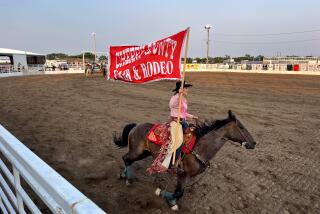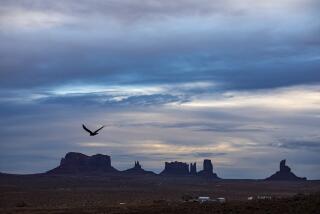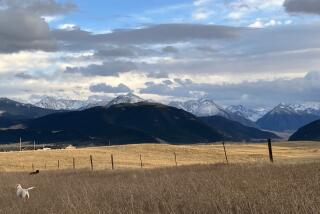Hope Flickers on a Waning Frontier
- Share via
CHUGWATER, Wyo. — Take a turn off the main road here, where the constant Wyoming wind blows, and it’s almost like entering a faded postcard of Americana: a lonely town hall, a glistening white library and a one-counter post office where no one waits in line.
But Chugwater’s main street, with its shuttered businesses and boarded windows, is empty, and the cattle easily outnumber the town’s 244 people. Even the River Rocks Steakhouse, once billed as “the most rocking place in Chugwater,” is closed.
No grocery store. No traffic. No doctor.
Some worry whether that all adds up to something else: No future.
Here and across the rural West, little towns like Chugwater face a big choice: Grow or die. As a population boom sweeps the West, some communities watch their children leave for the cities, their residents age and their towns fall off the map. Others, like Chugwater, feel their rural identities slipping away. They try to hang on to the past, or imagine a future as retirement havens, recreation hubs or suburbs for growing cities.
“It won’t be just sort of the ol’ cowboy image, the frontier,” said William Frey, a demographer at the Brookings Institution in Washington, D.C. “These are going to be sort of suburban cowboys.
“The West is clearly becoming the frontier in a different way now.”
Chugwater is just four blocks by seven blocks. It takes longer to get a chocolate milkshake at the soda fountain than it does to walk across town.
You can fill your tank at the gas station at the end of town or grab a bowl of Chugwater Chili -- the town’s claim to fame -- but if you’re looking for much else, you’ve probably taken a wrong turn.
“Are ya lost?” a man in a silver pickup asks a visitor.
On a recent spring evening, a father pulled his son down the street in a Radio Flyer wagon, the silence broken by a train roaring along the tracks nearby.
Kids climbed on the old red caboose parked in a gravel lot, even though they know better.
A kitten was stuck on a ledge inside a storefront window of an aging garage and even the mayor tried to figure out how to rescue it.
“It really has all the stuff you need for a small town,” said Lee Marfell, 64, peering out from under his cowboy hat. “Everyone’s really quite wonderful.”
*
Chugwater wants the world to know how wonderful it is. And please, bring your kids.
Worried about getting grayer and losing its school someday, the town is offering eight home sites to new residents for $100 apiece if they agree to build a house and stay at least two years. Preference is given to families.
The program, financed by a grant from the Wyoming Community Development Authority, is generating plenty of interest. Town Clerk Karen Guidice has already sent out more than 100 applications.
“We’re going to go down kicking and screaming, because we want our town to survive,” she said.
Tammie Harris, a single mother of two teenagers in Lander, Wyo., has never even been to Chugwater, but the prospect of owning land for just $100 was enough for her to apply for a lot. She hopes this is her ticket to owning her first home.
“You couldn’t ask for anything better,” she said. “I don’t care if it’s out in the middle of Timbuktu. If it’s going to be mine, I want it.”
Some signs of hope are apparent in this town plopped amid sagebrush and dusty roads under the Wyoming bluffs. The soda fountain is hiring, and the junior class is holding a bake sale to raise money for the prom. Around the corner, the junior high and high school track team is practicing in the street; there is no school track.
“Watch out, guys!” coach Shelly VanWhy yells to the runners as the occasional car passes.
Chugwater clearly isn’t going to dry up and blow away just yet, but town leaders know too well the cycle that doomed other small towns: Young people leave, a main industry is lost, corporate farming and ranching take over, and soon the population plunges.
The population here has seesawed since 1960, and actually gained a few people -- 52 -- from 1990 to 2000.
VanWhy grew up here and always knew that she would return. She and her husband just moved back and now have a baby girl. But she’s the exception around here.
Often it’s teenagers like Katie Rogers, a 16-year-old sophomore with a long, bouncy ponytail, who threaten small town survival. She loves that she’s known everyone here since she was a little girl. But she doesn’t plan to return after graduation.
“I kind of want to get away for a while, see how it goes,” she said, panting from her sprint with the track team.
Five years ago, young people like Katie were common. Every state had more people under 18 than people over 65, census figures show.
But by 2030, 10 states will have more people who are 65 and older, and three of those are in the West -- Montana, New Mexico and Wyoming. More than one of every four residents in those states will be 65 or older by then.
That doesn’t give small towns much hope for better days.
“The communities that are here now, so many of them have the desire to be saved, but again it’s going to have to come from within,” said Jon Bailey, director of research and analysis for the Center for Rural Affairs in Lyons, Neb.
Chugwater isn’t the first town to offer cheap land. Several Midwestern towns have tried so-called “mini-homestead acts.” Among them: Marquette, Kan.; Kenesaw, Neb.; La Villa, Texas, and New Richland, Minn.
In Marquette, 23 homes have been built or are under construction, and the population is up more than 100 people, from 527 a year ago. Other communities are slowly bringing in families. Four houses have gone up in Kenesaw; La Villa has seven new ones.
While towns see free land as their saving grace, Frey isn’t so sure.
“It’s not going to turn a corner for these places,” Frey said. “It’s just going to slow the drain.”
*
Chugwater got its name from the awful “chug” sound that bison made when they hit the ground as Indians drove them off the nearby cliffs.
The school mascot is, of course, the buffaloes. Rumors often float around that the school, enrollment 92 and the heart of the town, may close, but state and local officials insist that Chugwater is safe for now.
The nearby town of Albin wasn’t as lucky; it was forced to close grades 7-12 at the end of the 2002-03 year and students now are bused to other towns.
In communities where everyone shows up for basketball games, the loss of the only high school can be a death sentence.
For some, however, growth is scary. From 1990 to 2003, the growth rate of Western towns with 2,500 people or fewer was four times the rate for the rest of the country, according to Census Bureau figures. Some towns have seen their identities swallowed up by their larger neighbors and newcomers who demand city amenities. The transition from ranch town to bedroom community can be painful.
Over morning coffee at Chugwater’s soda fountain, Tim Ash worried that growth will bring too many problems -- a strained water supply, damage to roads.
Irene Glenn, 77, said the plan’s housing restrictions -- no mobile homes on the eight lots, at least three bedrooms -- were ridiculous and too expensive.
“Well, we’re getting laughed [at] all the way to Riverton,” she said, sipping soup at the senior lunch at the Chugwater Community Center. “I don’t even want to say I’m from Chugwater.”
Experts say small communities must maintain infrastructure, schools and businesses to survive. A one-industry town just doesn’t last.
Chugwater does have something going for it that other small towns don’t -- it’s only about 40 miles north of the capital, Cheyenne, and commuters can easily call Chugwater home.
“I think the character of the rural West may change,” Frey said. “There are these isolated communities that will still survive, but most of the growth will be these rural areas that are tied to the suburbs.”
Western towns should focus on what they have to offer -- beautiful scenery and recreational opportunities, said William Freudenburg, professor of environment and society at UC Santa Barbara and president of the Rural Sociological Society. Market to newcomers such as software designers, architects, carpenters, plumbers -- people who have made money elsewhere and can live anywhere they want.
“I think the West has something extra to offer,” he said. “No. 1 is the terrain, all those mountains, and No. 2, the dryness. It’s a problem for development not to have more water, but boy does that make it comfortable.”
Time will tell, Chugwater residents say, if their own growth plan will work.
When the sun sets and the streetlights blink on by the old grain silos, there is only the chatter of birds and sometimes the gossip that can spread from one end of town to the other before you even get there yourself.
It is this -- the calm, warm feeling of community -- that Chugwater wants to preserve.
“We’re just not ready to give it up,” Guidice said. “We feel like there’s just too much potential here.”
*
(BEGIN TEXT OF INFOBOX)
A changing town
Rural towns desperate to save themselves come up with many ideas. Here is how Marquette, Kan., is trying to lure new residents:
Plan: Free land to anyone who agrees to build a house within a year and stay in Marquette for at least a year.
Lots: Twenty-three homes already have been built or are under construction since the program began in November 2003; 58 more lots will be developed.
Benefit: Each house is expected to bring in about $1,000 to the town.
Population: 650 people, up from 527 a year ago.
School: An extra 30 students have enrolled in the kindergarten through eighth-grade school.
Change: “It’s been real nice,” Mayor Steve Piper said. “It’s been neat hearing some new ideas on how to do things, new thoughts. We’ve changed some, and those folks that moved here have changed.”
Source: Associated Press
Los Angeles Times
More to Read
Sign up for The Wild
We’ll help you find the best places to hike, bike and run, as well as the perfect silent spots for meditation and yoga.
You may occasionally receive promotional content from the Los Angeles Times.






